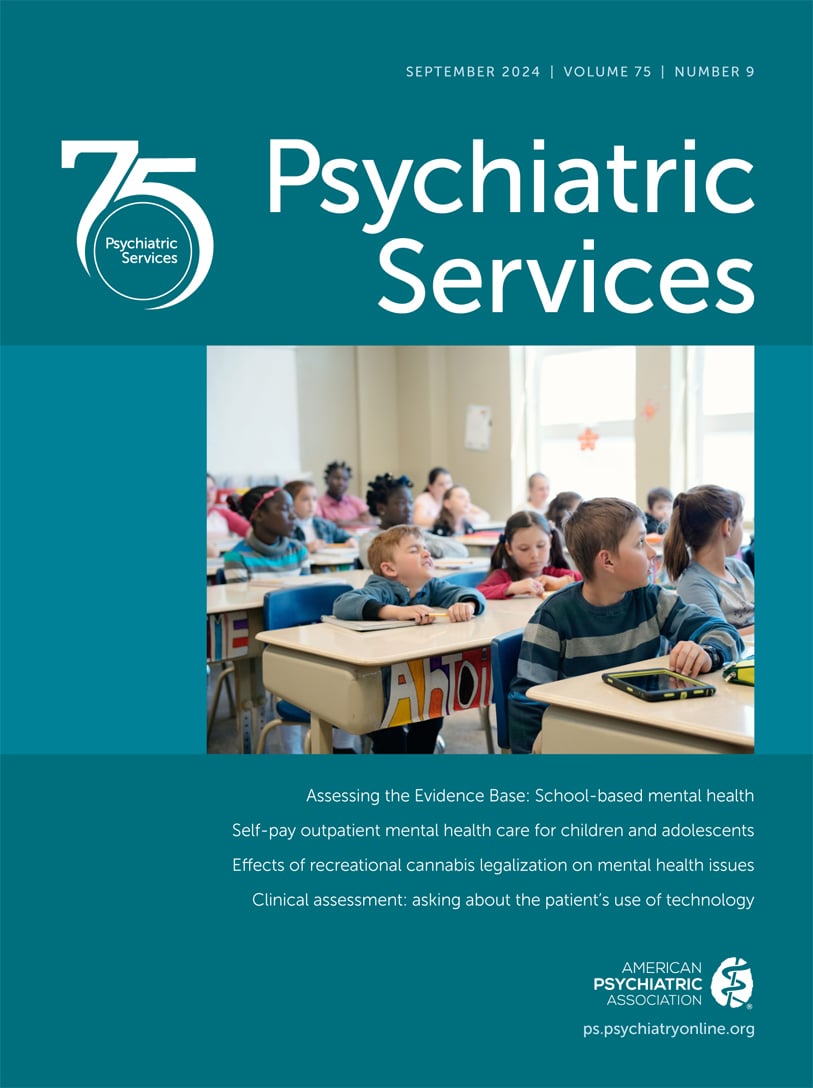Psychiatric Services
- Volume 64
- Number 2
- February 2013
Book Reviews
Taking Issue
This Month's Highlights
Columns
Publication date: 01 February 2013
Pages106–108To help grow a cadre of researchers with the knowledge and skills to pursue topics of great utility to public mental health systems, the director of the Division of Mental Health Services and Policy Research at Columbia University used funding from the ...
https://doi.org/10.1176/appi.ps.201200519Articles
Publication date: 01 February 2013
Pages111–119The individual placement and support model of supported employment (IPS-SE) is an effective way to help people with serious mental illness get and keep competitive jobs. However, relatively few people receive IPS-SE services, and policy experts argue for ...
https://doi.org/10.1176/appi.ps.201100499Publication date: 01 February 2013
Pages120–126For individuals in crisis, involuntary psychiatric hospitalization can be lifesaving—but also life disrupting. In Virginia, decisions to initiate involuntary commitment are made by emergency evaluators employed by 40 community service boards. Data from ...
https://doi.org/10.1176/appi.ps.000692012Publication date: 01 February 2013
Pages127–133Objective This study examined the costs and impact on receipt of hepatitis and HIV testing and hepatitis immunization services of a public health intervention model that was designed for use by persons with serious mental illness and co-occurring substance ...
https://doi.org/10.1176/appi.ps.000852011Publication date: 01 February 2013
Pages134–141Many studies of Iraq and Afghanistan veterans with mental disorders document low rates of service use. However, most studies look at use in the first year after returning from a deployment. Do rates of use rise as time since deployment increases? In the ...
https://doi.org/10.1176/appi.ps.004792011Publication date: 01 February 2013
Pages142–148Objective Veterans with posttraumatic stress disorder (PTSD) are frequently prescribed psychiatric medications that are currently not supported by a guideline developed by the U.S. Department of Veterans Affairs and the U.S. Department of Defense. To ...
https://doi.org/10.1176/appi.ps.201200217Publication date: 01 February 2013
Pages149–155Objective Practice guidelines used in the Veterans Health Administration (VHA) caution against benzodiazepine use by veterans with posttraumatic stress disorder (PTSD) because of inefficacy and safety concerns. Although use has declined, the VHA ...
https://doi.org/10.1176/appi.ps.201200267Publication date: 01 February 2013
Pages156–164Objective Nationwide studies contrasting service use of racial-ethnic groups provide an overview of disparities, but because of variation in populations and service systems, local studies are required to identify specific targets for remedial action. The ...
https://doi.org/10.1176/appi.ps.201200098Publication date: 01 February 2013
Pages165–172Objective This study examined the prospective relationship of substance use and mental health problems with risk of discontinuous enrollment in college. Methods Participants were 1,145 students at a large public university who were interviewed annually for ...
https://doi.org/10.1176/appi.ps.201200106Open Forum
Publication date: 01 February 2013
Pages173–176Psychiatrists in psychiatric hospitals or residential facilities can find themselves involved in patient crises that precipitate a restraint or seclusion. The decision to become directly involved must be made quickly, with little time for administrative ...
https://doi.org/10.1176/appi.ps.001652012Brief Reports
Publication date: 01 February 2013
Pages177–180Objective This study examined employment outcomes of veterans with substance use disorders and comorbid general medical and psychiatric disorders following substance abuse treatment. Methods The authors obtained employment and other information reported by 5,...
https://doi.org/10.1176/appi.ps.201200024Publication date: 01 February 2013
Pages181–184Objective The purpose of this study was to examine factors that predict job satisfaction among peer providers employed on professional treatment teams in community-based behavioral health agencies. Methods Surveys via Internet and postal mail gathered data ...
https://doi.org/10.1176/appi.ps.001452012Publication date: 01 February 2013
Pages185–188Objective The study sought to broaden the focus of research on caregivers’ burden by examining caregiving rewards and their relation to coping skills. Methods Data from semistructured interviews with 60 family caregivers of patients with mental illness in ...
https://doi.org/10.1176/appi.ps.001212012Publication date: 01 February 2013
Pages189–191Objective After the great East Japan earthquake of 2011, residents with intellectual disabilities and their caregivers in Fukushima were evacuated to the prefecture of Chiba. We investigated the impact of the earthquake on the caregivers’ burden. Methods ...
https://doi.org/10.1176/appi.ps.000802012Publication date: 01 February 2013
Pages192–195Objective This study examined demographic and clinical characteristics of frequent users of a psychiatric inpatient unit in Portugal. Methods Data (2004–2008) for 1,348 consecutive psychiatric inpatients were reviewed. Frequent users (N=137), who had at ...
https://doi.org/10.1176/appi.ps.000782012Publication date: 01 February 2013
Pages196–200Objectives: This study aimed to establish the prevalence rates of mental health and behavioral problems of Arab youths residing in Jordanian care centers due to family disintegration, maltreatment, or abandonment and to examine how functioning varies by ...
https://doi.org/10.1176/appi.ps.201200093Letters
News & Notes
Past Issues
View Issues Archive
Vol. 75 | No. 12

Vol. 75 | No. 11

Vol. 75 | No. 10
